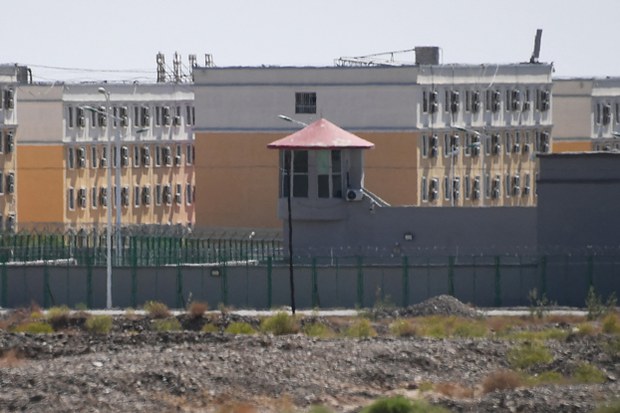Former Uyghur Muslim preacher confirmed dead in prison in China’s Xinjiang
Share

A view of the Artux City Vocational Skills Education Training Service Center north of Kashgar in northwestern China’s Xinjiang region, June 2, 2019.
A Uyghur Muslim preacher serving a five-year sentence in China’s far-western Xinjiang region for making a religious pilgrimage abroad died of liver cancer in prison in February, according to a police officer who works in the district where the preacher resided.
Omar Huseyin, 55, was the former hatip, or preacher, at the Qarayulghun Mosque in Korla, known as Ku’erle in Chinese and the second-largest city in Xinjiang. Authorities apprehended him in September 2017 amid a widespread crackdown on Islamic clergy and other prominent Uyghurs, for traveling to the holy city Mecca in 2015.
Authorities also detained Huseyin’s three brothers in 2017, one of whom was serving a 12-year sentence for participating in religious activities and died in prison.
Huseyin was healthy before authorities took him away for “re-education” in one of hundreds of facilities across Xinjiang where authorities detained an estimated 1.8 million Uyghurs and other Muslims purportedly to prevent religious extremism and terrorism.
Mahmut Moydun, a Uyghur inmate who escaped from another prison in Korla and was in hiding, told RFA that conditions at detention centers had been deteriorating because more inmates, including the preacher, had died in the last two years.
A Korla resident, who declined to be named for safety reasons, told RFA that the health of inmates incarcerated in city prisons had deteriorated due to low quality food, the intensity of prison labor, long political study sessions, and endless interrogations.
Huseyin was taken away for “re-education” in 2017 at a time when authorities were transforming internment camp centers in Korla into prisons, he said.
RFA contacted the Qarayulghun police station in Korla for a list of inmates who died in 2021 and 2022, but the political commissar refused to provide it. When asked for information about Huseyin, he said the police station in the district where the preacher used to reside could provide it.
“I cannot send you that information,” he said. “There is no such thing.”
A district policeman later confirmed that Huseyin was serving a sentence in the district prison and that he died on Feb. 2.
“He was healthy and was not sick at all before,” the officer said. “We learned that he died of late-stage liver cancer in the [prison] hospital. He died while being treated without being released.”
“At the time, the [Chinese Communist] Party and the government organized delegations to make the pilgrimage to Mecca, and he went there as a delegation member,” said the police officer, referring to a time before the 2017 crackdown when authorities encouraged Uyghurs to apply for passports and travel abroad.
After authorities arrested Huseyin for making a pilgrimage to Mecca, he was put on trial and sentenced to five years in jail, he said.
Authorities went to Huseyin’s home in 2020 and gave his family a secret trial document about him, said the policeman, but did not elaborate. After he died this February, authorities returned his body to his family.
Four brothers
Omar Huseyin was one of four brothers, ages 50 to 62, from the same family hauled in by authorities for “re-education” because they were considered a security threat for participating in religious activities, according to a Uyghur emigre from Korla who now lives in Turkey.
Besides the preacher, his elder brother, Samat Huseyin, also died in prison in 2021, said the émigré.
Samat Huseyin, a farmer who lived in Qarayulghun’s Baghjigde village in Qarayulghun town, was arrested with his three brothers amid the mass detentions of Uyghurs that began in 2017, said the émigré who declined to be identified for safety reasons.
Two of the brothers, Rahman and Ablet, “graduated” after spending two years in a re-education center because their attitudes had “improved,” while the other two were considered “problematic” and accused of disturbing public order by assembling with others, he told RFA.
Chinese authorities sentenced Omar to five years in prison and Samat to 12 years in jail, he added.
A security staff member of the neighborhood committee in Qarayulghun confirmed that the four men from a family of nine had been detained for “re-education,” with two of them later dying while imprisoned.
“One died in early 2021, and the other probably died in February 2022,” she said, adding that Samat died of stomach cancer.
The staffer also said Samat, 60, had been healthy before being taken away for “re-education,” and that he developed the disease while incarcerated and died in a prison hospital.
An employee at the local justice station confirmed that authorities arrested Samat in September 2017 for “violating public security” by participating in religious activities with other people.
“There was a rule in the re-education center that they could meet with their direct relatives, and arranged for them to meet each other once,” the staffer said.
Rahman, believed to be about 62 years old, was held for two years, while Ablet, the youngest of the four brothers, was detained in a Korla city re-education center, the person said.
Translated by RFA Uyghur. Written in English by Roseanne Gerin. Edited by Malcolm Foster.







